155 - Christmas in Bethlehem
Wednesday, December 23, 2015
Christmas in Palestine. It’s something that calls to many people, whether Jew, Christian, Muslim, or even agnostic. Birthplace of the alphabet, of Judaism, and of Christianity. With a million years of human settlement, it was one of the earliest places in the world to see organised human habitation and agricultural development.
Christmas in Jerusalem. The holiest city for Jews, for the last three thousand years. A focal point for Christians for two thousand years. A sacred site for Muslims for over fifteen hundred years. All three Abrahamic faiths place Jerusalem in a central role.
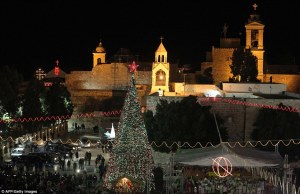 Christmas in Bethlehem. Manger Square. The Church of the Nativity. Just ten kilometres south of Jerusalem. But getting there isn’t so easy for independent travellers. There’s an imposing concrete wall separating Jerusalem from Bethlehem. A massive metal gate is controlled by Israeli soldiers. Snaking along Bethlehem’s outskirts, the 26′ high wall cuts part of the town off, affecting social, cultural, religious and economic life. A Quaker living on the Palestinian side, wrote: “Its impact is psychological too. Reflecting one morning on how it would be good to pay a quick visit to Jerusalem I was struck by feeling that I really didn’t Christmas in Bethlehem. Manger Square. The Church of the Nativity. Just ten kilometres south of Jerusalem. But getting there isn’t so easy for independent travellers. There’s an imposing concrete wall separating Jerusalem from Bethlehem. A massive metal gate is controlled by Israeli soldiers. Snaking along Bethlehem’s outskirts, the 26′ high wall cuts part of the town off, affecting social, cultural, religious and economic life. A Quaker living on the Palestinian side, wrote: “Its impact is psychological too. Reflecting one morning on how it would be good to pay a quick visit to Jerusalem I was struck by feeling that I really didn’t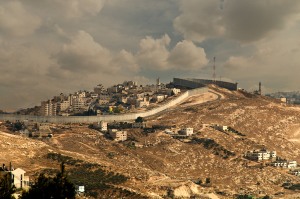 want to have to go through the barrier checkpoint. So not only are the people of Bethlehem physically cut off from their own capital city of East Jerusalem, but it seems to me that it creates a psychological barrier too. Many are not allowed to travel to Jerusalem anyway – they need permits to visit family; work permits; health permits to visit hospitals; religious permits to go to churches and mosques in Jerusalem. But in Bethlehem the presence of the separation barrier is a daily reminder and a physical representation of their situation” (http://old.quaker.org.uk/bethlehem-and-wall). want to have to go through the barrier checkpoint. So not only are the people of Bethlehem physically cut off from their own capital city of East Jerusalem, but it seems to me that it creates a psychological barrier too. Many are not allowed to travel to Jerusalem anyway – they need permits to visit family; work permits; health permits to visit hospitals; religious permits to go to churches and mosques in Jerusalem. But in Bethlehem the presence of the separation barrier is a daily reminder and a physical representation of their situation” (http://old.quaker.org.uk/bethlehem-and-wall).
Tourism in the Palestinian part of Bethlehem has almost collapsed, despite the central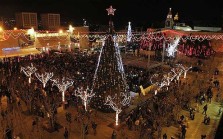 place that Manger Square and the Church of the Nativity hold for millions and millions of people internationally. The hotels in Bethlehem are struggling, though it is one of the most famous places in the world. The barrier is part of the problem – tourists are discomfited by seeing man-made divisions at first-hand. The only international airport in Palestine was bombed by Israeli forces in 2001, so most tourists fly into Israel now and are bussed in to Bethlehem on day-trips from their hotels on the Israeli side of the separation barrier. place that Manger Square and the Church of the Nativity hold for millions and millions of people internationally. The hotels in Bethlehem are struggling, though it is one of the most famous places in the world. The barrier is part of the problem – tourists are discomfited by seeing man-made divisions at first-hand. The only international airport in Palestine was bombed by Israeli forces in 2001, so most tourists fly into Israel now and are bussed in to Bethlehem on day-trips from their hotels on the Israeli side of the separation barrier.
Although only around 1.5% of Palestinians are Christians, the majority Muslim Palestinian population feel immensely proud of Bethlehem being the birthplace of a major world faith. Muslims believe in Jesus (Isa) as a prophet, and they too visit Bethlehem at Christmas – though for many families it’s a seasonal tradition, rather than a religious thing.
People of many faiths and none all have their own reasons to want to visit Palestine at Christmas. Nobody more so than Yousef. Except that the word “visit” puts a slight frown on his face. Because Yousef is a Palestinian refugee here in Málaga (154 – A Tale of Two Yousefs), and ultimately wants to live back there, safely, with his wife and tiny daughter, just like he used to, not far from his parents and his sister.
* * * * * * * * * * * * * * * * * * * * * * * * * * * * * * * *
A crash and a cry came from Yousef’s room and I heard my name. He appeared at my study door looking white. A letter from the Norwegian government had gone to his old address in Oslo, where he’d worked a few years before, and had been returned. So they’d emailed him to say that he had been granted Norwegian citizenship back in August and he needed to come and collect his passport. We talked half the night. What at first seemed like the answer to everything, wasn’t. Norway is not in the EU, though it is in the Schengen Agreement area. The passport would give him the right to live and work in Spain, but not to bring his family. Would it be better to continue the refugee process? Getting residency via the refugee route would give him the right to bring his family. But to demonstrate work contracts and social security contributions is tough – in crisis-ridden Spain NOBODY gets a work contract, let alone a refugee (far more likely to get casual work, paid under the counter).
In the end, to a man with no passport and just a document that says his country doesn’t exist, the prospect of a passport from a country in Europe (albeit not in the EU)  seemed like the pot of gold at the end of the rainbow. We worked out an overland bus route from Málaga to Oslo. Expensive, with countless changes. And off he went with a rucksack, crossing half a dozen countries without a passport. His timing was good – a week later ISIL / Da’esh bombed Paris and many borders closed, especially to Muslims. But Yousef sailed through, slept in some bus stations, kept in touch via WhatsApp, and collected the precious Norwegian passport. seemed like the pot of gold at the end of the rainbow. We worked out an overland bus route from Málaga to Oslo. Expensive, with countless changes. And off he went with a rucksack, crossing half a dozen countries without a passport. His timing was good – a week later ISIL / Da’esh bombed Paris and many borders closed, especially to Muslims. But Yousef sailed through, slept in some bus stations, kept in touch via WhatsApp, and collected the precious Norwegian passport.
Then back to Madrid, to do the honourable thing and deregister as a refugee, and collect his Palestinian passport. Back home in Colmenar he had a mountain of washing to be done, and a visit to the Málaga police to explain and to cancel his refugee status there too. And best of all, with a passport, he could book a flight to Palestine to see his wife and baby. Christmas in Palestine. The best present anyone could have. Especially when it’s home.
But his country’s only international airport is nothing but rubble. And the adjacent country does not permit him to use its airports. So we bought a Turkish Airlines ticket via Istanbul to Jordan, which is the nearest he’s allowed to fly to. After that he would face eight hours or more on buses, though showing the Norwegian passport at checkpoints was likely to lead to fewer delays. The Palestinian one would be shown only on arrival at his own border.
First though, we went down to Málaga airport a couple of days before his flight, to a Western Union office there, to collect some money Yousef’s father had sent to repay me for the flight. As clear as anything, I was treated to a demonstration of what Muslims face on a daily basis while simply trying to carry out normal tasks. Yousef has reasonable Spanish – certainly enough to offer the completed collection slip and his ID and to say to the young woman that the funds had been transferred a few hours before by his father. To say that she was aggressive and suspicious would be an understatement. She threw the paper back saying that the sender’s name was wrong. Yousef’s dad has four names, and he had put three on the slip. His father’s passport number was correctly filled in, as was the exact amount of euros (another security check, as only the sender knows precisely what their transfer is converted to in the target currency). They share surnames. His father had put the number of Yousef’s Norwegian passport on the slip at his end, and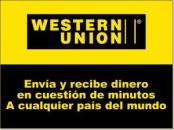 Yousef was carrying that passport. We had both witnessed other people collecting euros via Western Union and normally it takes about two minutes. But Yousef was put through the third degree. What was the money for? Who was sending it? What relation was the sender? Many questions were repeated, as though she was trying to catch him out. Yousef became more tense, and she became more suspicious. Eventually I joined in the conversation, trying to calm things down, though trying not to undermine him. With me she was entirely different, and soon handed over the euros. Yousef and I went for a coffee. “Is it often like that?” I asked. “Yes” he replied. Yousef was carrying that passport. We had both witnessed other people collecting euros via Western Union and normally it takes about two minutes. But Yousef was put through the third degree. What was the money for? Who was sending it? What relation was the sender? Many questions were repeated, as though she was trying to catch him out. Yousef became more tense, and she became more suspicious. Eventually I joined in the conversation, trying to calm things down, though trying not to undermine him. With me she was entirely different, and soon handed over the euros. Yousef and I went for a coffee. “Is it often like that?” I asked. “Yes” he replied.
Two days later we returned to the airport and Yousef flew to Aqaba, Jordan. Then he caught buses through Israel, and finally crossed back into Palestine for the first time after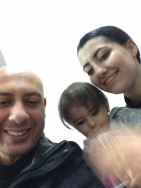 a year as a refugee, to give his wife and baby the biggest hugs ever. a year as a refugee, to give his wife and baby the biggest hugs ever.
Christmas in Palestine. Home with his family. Rediscovering his baby girl. Cooking again for his wife and both their extended families. Trying to forget the casual racism of the Western Union woman. Collecting his thoughts and planning the next steps. Planning for the day when all three of them can live legally in Spain together.
Christmas in Bethlehem. As a child Yousef went to Bethlehem with his parents every December, and he has made the journey across his country to Bethlehem an annual Christmas tradition. This week he had planned to take his wife, and for the first time his little daughter too, through the checkpoint to Bethlehem to join the happy crowds of  Muslims and Christians filling Manger Square at Christmas, peacefully and joyfully sharing a cross-cultural tradition at this special time of year. But then on Saturday fighting at the Ramallah checkpoint made their planned crossing too dangerous and the young couple could not take the risk with their small baby. Muslims and Christians filling Manger Square at Christmas, peacefully and joyfully sharing a cross-cultural tradition at this special time of year. But then on Saturday fighting at the Ramallah checkpoint made their planned crossing too dangerous and the young couple could not take the risk with their small baby.
There’s a painful irony there.
“Peace is not merely a distant goal we seek,
but a means by which we arrive at that goal."
– Martin Luther King.
© Tamara Essex 2015 http://www.twocampos.com
 0
Like
Published at 4:36 PM Comments (2)
0
Like
Published at 4:36 PM Comments (2)
154 - A Tale of Two Yousefs
Thursday, December 17, 2015
There’s a guy called Dirk Wolz in a small town in Germany who has opened his home to twenty-four Muslim refugees. #Respect. There are few people who would do that. Very few. I couldn’t. I have only one, and that’s been challenging and enriching in equal measures.
He washes up “wrong”. There’s stuff I’ve never seen before in the fridge. I have to put a dressing gown on to go downstairs to the loo in the night. He uses the washing machine almost every day. A coach and horses has been driven through my fiercely-guarded privacy. The night before he was due to move here from the Málaga refugee hostel, at the end of his permitted six months, I cried myself to sleep, dreading the loss of my privacy, and wishing I’d never offered him the spare room.
Yousef is Palestinian, from a small town a couple of hours north-west of Jerusalem. Gentle, cultured, skilled, speaking five languages, he wanted nothing more than to live quietly with his wife and their new baby. But when his life there became untenable and his workplace was attacked, he crossed over through a string of checkpoints, through Israeli territory to Jordan, and then flew to Madrid where he successfully claimed asylum. After four months in the asylum “holding centre” in Madrid, the authorities stuck a pin in a map and despatched him to the refugee centre at Málaga. In a small room with four metal bunks, his room-mates changed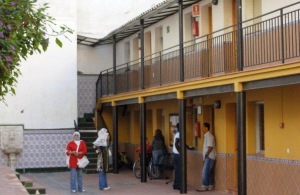 every few days. Unsettling. Refugees in Spain get six months in the official hostels, with access to free Spanish lessons, help with their paperwork, their meals, and sometimes job training courses. Yousef tracked down someintercambio groups in Málaga to speed up his Spanish – that’s where we met and became friends, early this year (143 – How the Other Half Lives). every few days. Unsettling. Refugees in Spain get six months in the official hostels, with access to free Spanish lessons, help with their paperwork, their meals, and sometimes job training courses. Yousef tracked down someintercambio groups in Málaga to speed up his Spanish – that’s where we met and became friends, early this year (143 – How the Other Half Lives).
Depending on their country of origin, some refugees find existing networks in Spain, but there are few Palestinians here. So at the end of his time in the hostel Yousef came to Colmenar to share my house. At the town hall, we sat in front of Antonia to register Yousef on the padrón (the local census). Her first request was for his passport. Nope, that’s in Madrid, held by the immigration department (as refugees are not allowed to travel out of the country). Instead he has a document that classifies him as a refugee with permission to work. Antonia had never seen one before – he’s the first refugee on the village padrón. She began to put his details on the computer. Place of birth? Palestina. Nationality? Bizarrely, despite naming his country of birth, his current nationality is printed as “País no reconocido”. Country not recognised. Antonia looked shocked. Yousef looked uncomfortable. It felt like a kick to the stomach. Can you imagine? To have no passport, and just a document that discounts your home, your country? For the millionth time I was thankful for the geographical fluke that provided me with a UK passport. passport, and just a document that discounts your home, your country? For the millionth time I was thankful for the geographical fluke that provided me with a UK passport.
Two thirds of UN member states officially recognise the State of Palestine, though few EU countries do. Neither the UK nor Spain do so. Antonia didn’t understand – thought it was an error. Tried to write “Palestina” on her computer. It wasn’t recognised. “But of COURSE it exists” she said. “Yes”, said Yousef sadly, “it’s beautiful and it’s my home”. Antonia fell silent. We had nothing we could say. She said she would find out how to register him, and that we were not to worry. I signed the paper to confirm my address as his home.
Back at the house, to celebrate him becoming “un vecino de Colmenar” Yousef knocked up a Palestinian paella. “Is that really a thing?” I asked. “No” he grinned. It was delicious. And during his time in the house he cooked wonderful Arab food for me a few times a week in between odd days of work gathering almonds in the Colmenar campo or driving a fork-lift in a Málaga warehouse. And all the time working towards the day when his wife and child could come to Spain too. up a Palestinian paella. “Is that really a thing?” I asked. “No” he grinned. It was delicious. And during his time in the house he cooked wonderful Arab food for me a few times a week in between odd days of work gathering almonds in the Colmenar campo or driving a fork-lift in a Málaga warehouse. And all the time working towards the day when his wife and child could come to Spain too.
Each of us can only “rate” our experiences within our own contexts, our own framework. When I first knew him I asked Yousef what his journey was like from Palestine to Madrid. “Terrible”, he had replied. And it was, challenged and delayed at every one of the many checkpoints. Though once he reached Jordan, it was a plane journey to Spain rather than the treacherous routes some have to face. Stressful and facing an uncertain future in the asylum system, but at the same time not much more uncomfortable than any other flight to Spain.
Just before the end of Yousef (1)’s stay in the refugee hostel, I met another Yousef in the room next door. Yousef (2) had travelled overland from Syria with his wife, 6 year-old daughter, and baby boy. The day I was there for coffee with Yousef (1), the new family had transferred to the hostel that morning from the holding centre at Melilla. Their journey, it has to be said, was tougher. Yousef (2) didn’t dare take his two small children the sea route via Turkey and Greece, so they travelled overland via Egypt, Libya, Algeria and Morocco. There, they sat for a month on cardboard staring at the fence – the same fence I’d crossed with confidence a year before, brandishing my UK passport (123 – Passport to Paradise). I’d crossed with confidence a year before, brandishing my UK passport (123 – Passport to Paradise).
After one failed attempt to cross the fence, where Yousef (2) reached the top but had to jump back down on the same side, the wrong side, when he couldn’t pull his family up, and after watching a friend who had hidden in the boot of a car being found by border patrols, the family put their trust and their entire savings in the hands of a Moroccan “fixer” in Nador. Some are crooks, take the money and disappear. Yousef (2) was lucky. The fixer was honest, he knew which of the Moroccan border police to bribe, and Yousef and his family finally walked through from Morocco into no-man’s land. Nobody had “fixed” the second part of the border crossing, the Spanish side, so the family aimed for a Guardia Civil officer of about Yousef’s age, walked up, and with almost a helpless shrug, said “Well, here we are.”
Perhaps it shouldn’t make a difference, but Yousef’s straight gaze, his wife’s beautiful pleading eyes, their daughter’s uncomprehending face under a head of curls, and the baby boy held out for the policeman to see, made it impossible for the Spanish police officer to refuse this desperate young Syrian family who had come so far through such terrible conditions, from their ravaged country, and who just needed three more yards to gain that foothold on Spanish soil. The Spanish policeman looked back across no-man’s land to the Moroccan policeman. They shared a nod, and the Spaniard jerked his head towards the promised land, and stepped back out of the way. The Syrian family walked to the Melilla immigration centre and applied for asylum. They were held there in an even more crowded holding centre than the Madrid one, and after a few months they too were sent to Málaga. Spanish policeman looked back across no-man’s land to the Moroccan policeman. They shared a nod, and the Spaniard jerked his head towards the promised land, and stepped back out of the way. The Syrian family walked to the Melilla immigration centre and applied for asylum. They were held there in an even more crowded holding centre than the Madrid one, and after a few months they too were sent to Málaga.
Yousef (1) handed me my mug of coffee and then took the kettle to the newcomers in the room next door so that the baby’s food could be mixed up. Meanwhile, Yousef (2) told me his story. “Are you going to learn Spanish?” I asked him (his English wasn’t bad). “No” he said, “We’re going to Germany”. He’s a high-level engineer working in the gas and electricity industries. And amazingly, a fortnight later when I went back to get one of Yousef (1)’s bags, Yousef (2) had gone. He had contacted the German immigration department, emailed his CV, and they had been sent a permit to travel to Berlin.
So Yousef (1) brought his bags, his strange washing-up habits, his humour and his excellent cooking skills to Colmenar. It turned out that having to put on a dressing gown for a midnight wee wasn’t the end of the world. Sometimes we did our own thing, sometimes we sat companionably by the wood-burner, reading but sharing the odd joke, and sometimes a meal would go on late into the night as we’d discuss religion and politics or he’d tell me about his country, his family, and his hopes. I discovered that actually “the wrong way” is merely a different way and that I could bite back the words before saying “Not that knife for that …”. for a midnight wee wasn’t the end of the world. Sometimes we did our own thing, sometimes we sat companionably by the wood-burner, reading but sharing the odd joke, and sometimes a meal would go on late into the night as we’d discuss religion and politics or he’d tell me about his country, his family, and his hopes. I discovered that actually “the wrong way” is merely a different way and that I could bite back the words before saying “Not that knife for that …”.
It is odd though – most of us don’t live platonically with other adults after our twenties. Certainly by our fifties we are set in our ways, there’s an unwillingness to change. Different mugs for different drinks, different knives for different things, a way of washing up. It’s not a bad lesson to learn, that “my way” is merely that, and is not the right way or the only way. Either way, I remember with shame my reluctance to share the house with a stranger; weighing up what Yousef has given up and had taken from him  over the past twelve months, what price my privacy? It’s not even close. Anyway, I have learned a thousand things from him and my life is far, far richer for knowing him. And I’m discovering what the stuff in the fridge is, too. over the past twelve months, what price my privacy? It’s not even close. Anyway, I have learned a thousand things from him and my life is far, far richer for knowing him. And I’m discovering what the stuff in the fridge is, too.
© Tamara Essex 2015 http://www.twocampos.com
 NOTE: Both Yousefs gave permission for their stories to be written. Both wanted people to understand more about who refugees are, why they have left their own countries, and how they are no different from any of us. These two Yousefs have children for whom they want what any parent wants – safety, shelter, and a future. NOTE: Both Yousefs gave permission for their stories to be written. Both wanted people to understand more about who refugees are, why they have left their own countries, and how they are no different from any of us. These two Yousefs have children for whom they want what any parent wants – safety, shelter, and a future.

 3
Like
Published at 8:51 AM Comments (3)
3
Like
Published at 8:51 AM Comments (3)
153 - A Different Planet
Friday, December 11, 2015
NASA experts tell us that it’s 25 million miles to get to another planet, but they’re completely wrong. It’s actually just 25 minutes away along the A-45.
 Colmenar – pueblo life, the mule clopping through the streets, the knife-sharpener’s penny whistle calling to his customers, the church bells sounding over the rooftops, fresh eggs from the neighbour’s campo chickens, the baker’s cheery greeting, a bag of vegetables hanging on the door-knob, and coffee round a neighbour’s kitchen table. Colmenar – pueblo life, the mule clopping through the streets, the knife-sharpener’s penny whistle calling to his customers, the church bells sounding over the rooftops, fresh eggs from the neighbour’s campo chickens, the baker’s cheery greeting, a bag of vegetables hanging on the door-knob, and coffee round a neighbour’s kitchen table.
25 minutes in the car and it’s another planet. Málaga city – lively streets, galleries, music, countless bars and multi-cultural events. The glorious port, the Malagueta beach, a great international city. Poverty and homelessness, inevitably, but also the charities that help. Vibrancy, noise, something going on every week.

Just 25 minutes down the A-45, then a few more minutes searching for parking near the dry river that bisects the city. Across the bridges the historic centre bustles with life, especially now with the crowds who gather each evening to see the stunning Christmas lights along Calle Larios.
The language is easier to understand in Málaga! The pueblo accent can be a little impenetrable at times, especially amongst older neighbours, who simply can’t slow down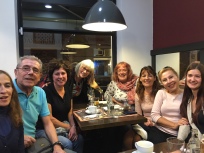 to help the guiri in their street understand. Speaking slowly and clearly has become a habit for me, when speaking English to students at the Escuela Oficialor to the city-centre group I help once a week. Friends visiting from the UK are co-opted to chat in English to the Spaniards, even friends of friends are dragged along. One, unbeknownst to me, turned out to be a sex therapist, which somewhat changed the direction of the conversation that particular evening! The group went back to their English lessons the next day with an enhanced vocabulary … to help the guiri in their street understand. Speaking slowly and clearly has become a habit for me, when speaking English to students at the Escuela Oficialor to the city-centre group I help once a week. Friends visiting from the UK are co-opted to chat in English to the Spaniards, even friends of friends are dragged along. One, unbeknownst to me, turned out to be a sex therapist, which somewhat changed the direction of the conversation that particular evening! The group went back to their English lessons the next day with an enhanced vocabulary …
With classes two or three times a week at La Escuela Oficial de Idiomas, and a growing love of Málaga, it made sense to have a room so I could stay over. It’s a knockout combination – spending half a week in the city and half in the pueblo, each place equally wonderful, and totally different.
In the pueblo, feet are the mode of transport. To the bakery, to the bank, to the bars. Around the edge to enjoy the views, or up to La Ermita to get the lungs going. In the city I can jump on a bus, or wave a card to release one of the Málaga Bicis, borrowing a bicycle for half an hour at no cost, to get me to Pedregalejo or across the city. But I walk a lot in the city too – far more than I did in the UK. Walking to La Escuela Oficial de Idiomas twice a week, to Los Ángeles Malagueños de la Noche, to Museo Carmen Thyssen, to the central market, the beach, or to one of the many favourite bars and restaurants.

And now it is December. A few nights in Málaga, photographing the Christmas lights and the belenes (nativity scenes, but these Spanish ones show more than just the stable – they can be ten metres long, depicting dozens of Bible stories and the whole village life). There are over 60 to be visited around the city – my two favourites are in theayuntamiento (Málaga city hall) and the Museo de Vidrio y Cristal (the glass museum, with a nativity scene made of Lladró porcelain statues).

The local bomberos (firefighters) had posed for a calendar in aid of Los Ángeles Malagueños de la Noche so I bought an armload for friends. Jess was leafing through it outside Gourmet Mercado Merced when half a dozen Spanish ladies came over to ogle the well-oiled muscles. In the city it is easy to chat with strangers – some “interests” cross all cultural boundaries! Two groups of women sharing smiles and laughter, and admiring the flesh.
Then a few nights at home in Colmenar, relishing the comfortable companionship of the village. It’s hard to remember that nobody here in Spain has known me for more than three and a half years. In Málaga, people call me by name in my regular haunts, and in Colmenar it is the same. Plus there is always a brasero in the house next door, where I know I can tuck my legs under the long tablecloth and share a coffee and a sugary rosco. Two different planets. Both of them are home.
© Tamara Essex 2015 http://www.twocampos.com
 3
Like
Published at 10:00 AM Comments (2)
3
Like
Published at 10:00 AM Comments (2)
152 - The Nicest People do Intercambio
Wednesday, December 2, 2015
The theory proves itself right, time after time after time.
Like-minded people, practising languages together.
So why does it work so well? Obviously nobody can get on with everybody. But there seems to be one thing that makes intercambio work – and it’s as much about the people who aren’t there, as the people who are there.
Think about it a moment. On the surface it’s about practising the languages, us practising our Spanish and them practising English, German, French or whatever. Straightforward. But there’s more to it than that. It means going somewhere where there will be …. well …. FOREIGNERS! It’s kind of a fundamental part of it! So (and here’s the good bit …)intercambio rather rules out the sort of people who – to put it bluntly – don’t like foreigners. 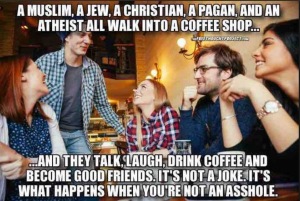 And this suits me just fine. The ones that are in the UK, complaining about multi-culturalism while phoning for a curry, signing petitions to close the borders while booking their holiday in the sun, voting Ukip while browsing overseas property sites and underpaying their Polish plumber. And the ones that are here in Spain, living in “guiri-ghettos”, complaining that nobody in their doctors’ surgery speaks English, searching for the best English breakfast along the coast, calling Spanish workers lazy or crooks on “expat” internet forums (yes, I’m afraid they do!). The great thing is, they tend not to join intercambio groups. And this suits me just fine. The ones that are in the UK, complaining about multi-culturalism while phoning for a curry, signing petitions to close the borders while booking their holiday in the sun, voting Ukip while browsing overseas property sites and underpaying their Polish plumber. And the ones that are here in Spain, living in “guiri-ghettos”, complaining that nobody in their doctors’ surgery speaks English, searching for the best English breakfast along the coast, calling Spanish workers lazy or crooks on “expat” internet forums (yes, I’m afraid they do!). The great thing is, they tend not to join intercambio groups.
 What we DO get at intercambio groups is people with open minds. People from all nations, who actively want to meet people from other countries, other cultures, other religions or none, and with other languages. People who have gone out of their way to put themselves in a position where they might be the only person who speaks their particular language, or has their particular background or frame of reference. What we DO get at intercambio groups is people with open minds. People from all nations, who actively want to meet people from other countries, other cultures, other religions or none, and with other languages. People who have gone out of their way to put themselves in a position where they might be the only person who speaks their particular language, or has their particular background or frame of reference.
 Every time our big intercambio group has a day out (a lunch, a mountain walk, a gallery visit, or a weekend in the Alpujarras) newer members ask “How come everyone’s so nice?” The answer is that once you take out the “biffers” and the “kippers” (Britain First and UKIP members), you are left with people from across the political spectrum who share open minds and a desire to knock down the barriers that language, culture, and national differences can put in the way of normal productive human relationships. Every time our big intercambio group has a day out (a lunch, a mountain walk, a gallery visit, or a weekend in the Alpujarras) newer members ask “How come everyone’s so nice?” The answer is that once you take out the “biffers” and the “kippers” (Britain First and UKIP members), you are left with people from across the political spectrum who share open minds and a desire to knock down the barriers that language, culture, and national differences can put in the way of normal productive human relationships.
 And sharing food is a great way of bonding. So the Spanish style of big shared platters in the middle, conversations flowing, the occasional fork extended to spear a green pepper or a chunk of meat, is ideal. That’s why Rafa’s immersion weeks do seem rather to revolve around food! And sharing food is a great way of bonding. So the Spanish style of big shared platters in the middle, conversations flowing, the occasional fork extended to spear a green pepper or a chunk of meat, is ideal. That’s why Rafa’s immersion weeks do seem rather to revolve around food!
With another exam booked, and the long summer break with no classes, heading off on another Spanish language immersion week was the perfect way to keep on top of those pesky subjunctives and all the new vocabulary. The Córdoba week organised by Rafa at Experiencia Vivees had been simply fabulous (written up in “Of Acorns, Olives, and Old Andaluz” and in “Immersion not Drowning”), his website was full of tempting offers and I signed up for the Granada week.
It’s supposed to be about language, culture, scenery, people, experiences ….. But it does always seem to be about the food! With three teachers and five students, the group immediately felt like we were on holiday with our mates. The teachers are all native speakers (a mixture of South American and Spanish) and professional teachers, giving us a flavour of different accents and vocabulary. The students come from everywhere – Russia, Holland, the Philippines, Switzerland, the US etc. Rafa always puts together a really special programme of visits – and in Granada we also had our on-the-ground expert, Beatriz, who gives Spanish lessons by Skype. Her local knowledge and insider tips made it an unforgettable week. Every meal was in a really special place, that as a normal visitor we would never have found. speakers (a mixture of South American and Spanish) and professional teachers, giving us a flavour of different accents and vocabulary. The students come from everywhere – Russia, Holland, the Philippines, Switzerland, the US etc. Rafa always puts together a really special programme of visits – and in Granada we also had our on-the-ground expert, Beatriz, who gives Spanish lessons by Skype. Her local knowledge and insider tips made it an unforgettable week. Every meal was in a really special place, that as a normal visitor we would never have found.
The aim of going on the immersion week was to consolidate some grammar before the DELE exam in November. With such small groups, the teachers can help each student with their own learning aims. For some, getting through sentences and being able to communicate is the most important, without worrying about every mistake. Others want corrections, and want to practise certain grammatical constructions. The week works, whatever your objective is – and on top of that is a brilliant holiday. Apart from getting to know corners of Granada I never knew existed, I got the practice and the confidence I needed to start the new term at the Escuela Oficial de Idiomas, and to do the DELE B2 exam.
 Rafa’s week, chatting with people from the far east, Russia and Peru using our shared common language of Spanish, clarified why learning this language is so important. It breaks down barriers, it offers communication, it minimises differences and enables us to learn about each other’s countries and cultures. Always interesting people. Hands across the water. Open minds. Rafa’s week, chatting with people from the far east, Russia and Peru using our shared common language of Spanish, clarified why learning this language is so important. It breaks down barriers, it offers communication, it minimises differences and enables us to learn about each other’s countries and cultures. Always interesting people. Hands across the water. Open minds.
Whether it’s an immersion week, a language Meetup event, Spanish classes where most learners are not British, or just an intercambio group in a bar, we’re doing more than simply improving our Spanish to make chatting to our neighbours easier. We’re also opening up channels of communication with people from every nation, all using Spanish to join us together and bridge our differences. And just at this moment, with everything that’s going on in the world, surely anything that increases communication and cross-cultural understanding, has to be a good thing, ¿no?
© Tamara Essex 2015 http://www.twocampos.com
Notes:
In 2016 Experiencia Vivees will run the Córdoba immersion week in April and October, the Málaga week in June and September, and the Granada week in May and September. A new Seville week is planned but no dates are announced as yet. www.experienciavivees.com
Beatriz Mora is a teacher of Spanish via Skype www.bmspanish.com
I have no business or financial connection with either.
 3
Like
Published at 4:58 PM Comments (4)
3
Like
Published at 4:58 PM Comments (4)
Spam post or Abuse? Please let us know
|
|